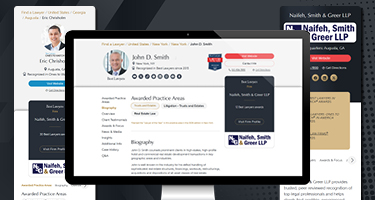To succeed in digital marketing, it's crucial to grasp the intricacies of how search engine rankings work. This principle is particularly important for your law firm as you aim to enhance your online visibility. One metric that significantly impacts a website’s ranking potential is domain authority. This guide will explain:
- What this search engine ranking score is
- Why it matters for law firms
- How to improve it to achieve digital marketing success
What is Domain Authority?
Domain authority (DA) is a metric developed by Moz to evaluate the strength of a website's domain in search engine results pages (SERPs). In straightforward terms, it's a predictor of how well a site is likely to rank on Google and other search engines.
This website's competitiveness score varies between 1 and 100, where higher numbers suggest an increased probability of attaining better rankings.
How is Domain Authority Calculated?
DA is evaluated by analyzing various factors that contribute to a website's overall rating. Understanding these elements can help law firms devise strategies to enhance their website authority. Key components include:
- Root Domain Links: This metric highlights the number and quality of unique domains linking to your website. A higher number of reputable, relevant domains can greatly enhance your SERP predictor score.
- Total Backlinks vs. Link Quality: While having a large quantity of backlinks can be advantageous, the significance of relevance and quality cannot be overstated. Links from authoritative sites in the legal field hold particular value.
- Site Structure: A well-organized, user-friendly site structure can positively impact your website prestige score. Ensure that the website is user-friendly, optimized for mobile devices and loads swiftly.
- Content Quality: Search engines favor content that is informative, authoritative and engaging, which can also help in acquiring backlinks.
- Social Signals: Engagement and shares on social media platforms can indirectly affect your SEO Score. Boosting engagement and visibility on social media can result in more backlinks and improved content exposure.
- Domain Age: Established domains usually possess greater authority. However, this factor is less significant than others and should be considered within the broader context of overall SEO strategies.
- On-Page SEO: Proper implementation of on-page SEO techniques, such as optimizing meta tags, headers and keywords, is crucial for improving your DA.
Benefits of a High Website Authority
Achieving a high SERP predictor score brings a multitude of benefits for law firms. Firstly, a higher DA significantly enhances your chances of ranking on the first page of search results, leading to increased organic traffic. This improved visibility attracts more clients, particularly in a competitive landscape where differentiation is crucial.
Websites with stronger SEO health scores are more likely to earn the trust and engagement of potential clients, enhancing your firm’s credibility and reputation. Moreover, a robust website ranking prediction score can set your firm apart, enabling you to capture a larger market share.
How to Measure and Improve Your Site's Authority Metric
After you understand the factors that contribute to your website's prestige score, it's essential to measure and implement strategies to improve it. Here are some best practices tailored for law firms:
- Build Relationships: Network with reputable websites and industry influencers to earn high-quality backlinks. Guest posting can also be beneficial for improving your ranking potential.
- Boost On-Page SEO: Consistently refresh your website's meta descriptions, title tags and internal linking structure.
- Monitor and Analyze: Continuously monitor your DA and analyze which strategies are working. Utilizing tools such as Google Analytics and Moz can assist in monitoring your progress and refining your strategies as needed.
The Role of Content in Enhancing Website Authority
Ultimately, high-quality content serves as the foundation for elevating your website's prestige score. Law firms should prioritize crafting content that resonates with their target audience, utilizing various formats to engage and inform such as:
- Informative Articles: Creating content that answers frequently asked legal questions not only highlights your expertise but also helps in attracting valuable backlinks, boosting your site's reliability.
- Case Studies and Success Stories: Sharing detailed accounts of successful cases can be compelling and authoritative, encouraging other sites to link to them.
- Client Testimonials: If permitted by your state bar, showcasing positive feedback from clients builds trust and credibility, demonstrating the real-world impact of your legal services.
- Frequent Updates: Maintaining fresh and current content indicates to search engines that your website is active and pertinent, which enhances your site's SEO performance.
- Multimedia Content: Incorporate videos, infographics and podcasts to engage your audience and diversify your content offerings. Multimedia content can attract more backlinks and social shares.
The Importance of User Experience (UX)
User experience is a critical component of SEO and can influence DA. Law firms should ensure that their websites are mobile-friendly, fast-loading and easy to navigate. As most searches are now performed on mobile devices, it's crucial to have a site optimized for mobile use.
Site speed also affects user satisfaction and can influence your rankings. Utilize tools such as Google PageSpeed Insights to pinpoint and resolve performance issues. A well-structured site with clear navigation helps users find information quickly, reducing bounce rates and increasing engagement.
Factors Beyond Website's Prestige Score
Although DA plays an important role, it isn't the sole element affecting your site's SEO performance. Law firms should also focus on:
- User Engagement: Indicators such as bounce rate, average time spent on the site and the number of pages viewed per session show how users are interacting with your website. Improving these engagement metrics can have a positive effect on your SEO.
- Technical SEO: Ensuring your site is technically sound, with proper indexing, fast load times and mobile optimization, is essential for maintaining and improving rankings.
- Local SEO: Local search engine optimization is crucial for law firms. Optimizing for local search queries and managing your Google My Business profile can drive targeted traffic to your site.
Strengthen Your Law Firm’s Online Authority
Domain authority is a key piece of the puzzle when it comes to being discovered by potential clients. But building a strong online presence takes more than just backlinks—it requires a comprehensive strategy.
Access our free step-by-step guide to learn how your firm can combine SEO, legal directory listings and content marketing to stand out in search results and connect with the right audience.































